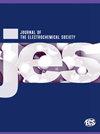嵌入还原氧化石墨烯的氧化钒纳米棒的稳健双色电致色性:揭示机理
IF 3.3
4区 工程技术
Q2 ELECTROCHEMISTRY
引用次数: 0
摘要
五氧化二钒(V2O5)与阴极和阳极着色有关,被认为是用于节能智能电子产品的最佳电致变色(EC)材料之一。在此,我们采用简便的湿化学方法,介绍了在还原氧化石墨烯(rGO)基质中加入 V2O5 的制备方法和详细的机理分析,以改善其电致变色特性。微观结构研究表明,在还原氧化石墨烯基质中形成了突出的 V2O5 纳米棒。优化后的电致变色薄膜的着色时间(tc)和漂白时间(tb)分别为 6.2 秒和∼4.8 秒,远远快于原始 V2O5 样品的颜色切换动力学(tc ∼ 19.4 秒,tb ∼ 15.3 秒)。更分散的结构还确保导电率薄膜的光学调制能力提高了约 400%,并反映出 V2O5 薄膜着色效率(∼347 cm2/C)的显著提高。用 rGO 进行改性后,V2O5 的电化学氧化还原稳定性得到了显著提高,其电化学氧化还原稳定性可高达 5000 个 CV 周期,且曲线区域的劣化程度最小。纳米棒结构的形成是改善离子扩散从而提高性能的主要因素。本文章由计算机程序翻译,如有差异,请以英文原文为准。
Robust Dual-Color Electrochromism of Vanadium Oxide Nanorods Embedded on Reduced Graphene Oxide: Unraveling the Mechanism
Vanadium pentoxide (V2O5), associated with both cathodic and anodic coloration, is considered as one of the best electrochromic (EC) materials for energy-saving smart electronics. Here we present the fabrication and detailed mechanism analysis for improving the electrochromic properties of V2O5 incorporated in a reduced graphene oxide (rGO) matrix using a facile wet chemical method. The microstructural study disclosed the formation of prominent V2O5 nanorods embedded in the rGO matrix. The optimized electrochromic film resulted in coloration (tc) and bleaching time (tb) of ∼6.2 and ∼4.8 s, respectively, much faster than the color switching kinetics of the pristine V2O5 sample (tc ∼ 19.4 s, tb ∼ 15.3 s). The more dispersed structure also ensured an approximate 400% enhancement in the optical modulation of EC film and reflected a noticeable improvement in the coloration efficiency (∼347 cm2/C) of V2O5 film. Modification with rGO resulted in an outstanding improvement in the electrochemical redox stability of V2O5 up to 5000 CV cycles with minimum deterioration in the curve area. The formation of nanorod structure was the prime factor for better ion diffusion and thereby facilitating enhanced performance.
求助全文
通过发布文献求助,成功后即可免费获取论文全文。
去求助
来源期刊
CiteScore
7.20
自引率
12.80%
发文量
1369
审稿时长
1.5 months
期刊介绍:
The Journal of The Electrochemical Society (JES) is the leader in the field of solid-state and electrochemical science and technology. This peer-reviewed journal publishes an average of 450 pages of 70 articles each month. Articles are posted online, with a monthly paper edition following electronic publication. The ECS membership benefits package includes access to the electronic edition of this journal.

 求助内容:
求助内容: 应助结果提醒方式:
应助结果提醒方式:


